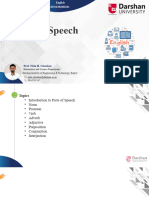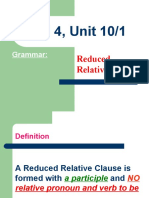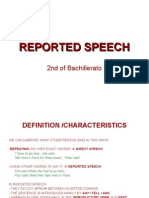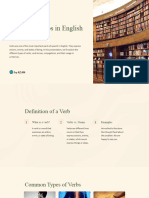The Infinitive
The Infinitive
Uploaded by
Claudia VasileCopyright:
Available Formats
The Infinitive
The Infinitive
Uploaded by
Claudia VasileOriginal Description:
Copyright
Available Formats
Share this document
Did you find this document useful?
Is this content inappropriate?
Copyright:
Available Formats
The Infinitive
The Infinitive
Uploaded by
Claudia VasileCopyright:
Available Formats
THE INFINITIVE/-ING FORM/PARTICIPLES
Forms of the Infinitve
Present Pres.Cont Perfect Perf.Cont Active Voice (to) play (to) be playing (to) have played (to) have been played Passive Voice (to) be played
Forms of the ing form
Active Voice playing -having played -Passive Voice being played --having been played ---
(to) have been played
*Passive Present Continous and Perfect Continous Infinitives are rarely used.
FORMS OF THE INFINIVE CORRESPONDING TO VERB TENSES Verb tenses Present Simple/Future simple she cleans/she will clean Present Continous/Future Continous she is cleaning/ she will be cleaning Past Simple/Present Perfect/Past Perfect/Future Perfect she cleaned/she has cleaned/she had cleaned/she will have cleaned Past Continuous/Present Perfect Continuous/Past Perfect Continuous/ Future Perfect Continuous she was cleaning/she has been cleaning/she will have been cleaning Forms of the Infinitive Present (to clean) Present Continous (to) be cleaning Perfect (to) have cleaned
Perfect Continuous (to) have been cleaning
The to-infinitive is used
to express purpose. You should take a few days off to recover. after certain verbs (agree, appear , decide, expect, hope , plan , promise , refuse etc) He agreed to meed us tonight.
The ing form is used
as a noun. Smoking is harmful. after certain verbs (admit, anticipate, appreciate , avoid, consider, continue , delay, deny, discuss , enjoy, escape, excuse, fancy,
after certain adjectives( happy,glad , sorry etc) I was sorry to hear about your accident.
finish , forgive, go ( pshical activities) , imagine, involve, keep (= continue), mention , mind , miss, object to , postpone , practise , prevent, quit , recall , recollect , report , after I would like/would love/would prefer to resent , resist , risk , save ,stand , suggest, express specific preference. tolerate , undersand etc) Id love to visit India. They have postponed moving house till next week. after certain nouns after: dislike , enjoy, hate , like , love , prefer , Its such a pleasure to be with you. to expres general preference. after too/enough constructions I like swimming. (in general) Its too early to leave the party. *Note: like + to-inf = its a good idea Hes rich enough to afford a Porsche. I like to help people. Theres enought food to go round. with: it + be + adjective( + of + noun/ after: Im busy , its no use, its (no) good , its pronoun) (not) worth, whats the use of , cant help, It was unkind of her to say that. theres no point (in), cant stand. have with: so + adjective + as. difficulty (in) , in addition to , as well as , have Would you be so kind as to pass the sauce? trouble , have a hard/difficult time. Theres no point in arguing. Whats the use of crying? It was your fault. with only to express an unsatisfactory after: spend/waste (time , money etc) result. You waste to much time watching TV. He won in the lottery only to lose at the casino. after prepositions. He becom
after: be + the first/second etc/ next/ last / best etc. She was the first to congratulate him. in the expression: for + noun/ pronoun + to inf. For John to lend you his car was very unsual. in expressions such as: to tell you the truth, to begin with , to be honest etc. To be honest, I didn;t know how to react. Note: If two infinitives are joined by and or or, the to of the second infinitive can be omitted. Id prefer to go to a disco and dance or talk to
my friends.
You might also like
- List of Verbs, Nouns Adjectives & AdverbsDocument4 pagesList of Verbs, Nouns Adjectives & Adverbskrishnachivukula71% (21)
- American Language Hub 4 WorkbookDocument76 pagesAmerican Language Hub 4 WorkbookDr. Sai Ko Ko ZawNo ratings yet
- Passive Advanced GrammarDocument14 pagesPassive Advanced GrammarЖуравлёва ДарьяNo ratings yet
- Features of Writing - Part 2Document20 pagesFeatures of Writing - Part 2Uang KejuNo ratings yet
- Verbs How Many Could There Be??????: "6 Different Categories of Verbs? That's Crazy!"Document22 pagesVerbs How Many Could There Be??????: "6 Different Categories of Verbs? That's Crazy!"Malik DaniyalNo ratings yet
- Adjectives and AdverbsDocument13 pagesAdjectives and AdverbsGabriela RînjeaNo ratings yet
- Degree of ComparisonDocument23 pagesDegree of Comparisonesalisa23No ratings yet
- Stucture Word ClassesDocument10 pagesStucture Word ClassesDwiNo ratings yet
- Ergative Verbs 1Document6 pagesErgative Verbs 1Altar IstnNo ratings yet
- Passive With Reporting VerbsDocument7 pagesPassive With Reporting VerbsmarcosgarciacarreraNo ratings yet
- Present Perfect Simple/present Perfect Progressive/modal VerbsDocument24 pagesPresent Perfect Simple/present Perfect Progressive/modal VerbsCindy Lizeth Valle SalasNo ratings yet
- Sentence StructureDocument26 pagesSentence StructureRachel Cheche FranciscoNo ratings yet
- Verb PatternsDocument4 pagesVerb PatternsOum El GhoulNo ratings yet
- Gerunds and Infinitives NewDocument7 pagesGerunds and Infinitives NewMaizura IsmailNo ratings yet
- CBATELP GERUNDS AND INFINITIVES-Summary ChartDocument1 pageCBATELP GERUNDS AND INFINITIVES-Summary ChartAna Jessica Acha MendietaNo ratings yet
- The Perfect Infinitive WebDocument2 pagesThe Perfect Infinitive WebEugenia DvortsovaNo ratings yet
- General Grammar ReviewDocument7 pagesGeneral Grammar ReviewKimNo ratings yet
- Unit-1: Parts of SpeechDocument86 pagesUnit-1: Parts of Speechsinhalz4772No ratings yet
- Gerunds and InfinitivesDocument14 pagesGerunds and InfinitivesLeonardo DannyNo ratings yet
- Gerunds and Infinitives: - GerundDocument20 pagesGerunds and Infinitives: - GerundpenggemarsherinaNo ratings yet
- Passive V (Part 2)Document30 pagesPassive V (Part 2)ayeshastudies888No ratings yet
- Three-Word Phrasal Verbs: Holman SanabriaDocument6 pagesThree-Word Phrasal Verbs: Holman SanabriaHolman SanabriaNo ratings yet
- Relative Clauses and Reduced Relative ClausesDocument5 pagesRelative Clauses and Reduced Relative ClausesMARGARITA DE LA PEÑANo ratings yet
- Past TensesDocument17 pagesPast TensesMjose Leal SepúlvedaNo ratings yet
- Table of TensesDocument7 pagesTable of TensesmrzzubairNo ratings yet
- The Participles 2Document13 pagesThe Participles 2krostinichu100% (1)
- Reduced Relative ClausesDocument8 pagesReduced Relative ClausesNicoleta GrigorasNo ratings yet
- What Are Linking Verbs? (With Examples) : Verb Subject Predicate Linking VerbDocument3 pagesWhat Are Linking Verbs? (With Examples) : Verb Subject Predicate Linking VerbAhmed Rubel100% (1)
- Meeting 8 - Correlative Conjunctions Per GroupDocument4 pagesMeeting 8 - Correlative Conjunctions Per GroupNovi Ainayya SalsabilaNo ratings yet
- Participle ClausesDocument2 pagesParticiple Clausese_marn2566No ratings yet
- Participle ClausesDocument14 pagesParticiple ClausesMaríaEstelaVinellaNo ratings yet
- Prefix, Root, SuffixDocument15 pagesPrefix, Root, SuffixdinejedidahNo ratings yet
- GERUNDS - (Verbos Seguidos de Ing) : Get Used ToDocument4 pagesGERUNDS - (Verbos Seguidos de Ing) : Get Used Topepitomunioz100% (2)
- PrepositionDocument2 pagesPrepositionlogiece89No ratings yet
- The Forms of InfinitiveDocument10 pagesThe Forms of Infinitiveprodaja47No ratings yet
- Theory - I Wish - If OnlyDocument1 pageTheory - I Wish - If OnlylamanandaNo ratings yet
- Grammar Articles DeterminersDocument110 pagesGrammar Articles DeterminersJhoey Cabuyadao100% (1)
- Defining and Non-Defining Relative ClausesDocument7 pagesDefining and Non-Defining Relative ClausesAnnaNo ratings yet
- All You Ever Wanted To Know About .: Personal, Subject, Object, Possessive, Reflexive, and IndefiniteDocument30 pagesAll You Ever Wanted To Know About .: Personal, Subject, Object, Possessive, Reflexive, and IndefiniteRaito LurusNo ratings yet
- Nominal ClausesDocument2 pagesNominal Clausesconstantinescu ancaNo ratings yet
- Relative ClausesDocument8 pagesRelative ClausesSafae JabriNo ratings yet
- Gerunds and InfinitivesDocument3 pagesGerunds and InfinitivesFanny Bettina Lubo LozadaNo ratings yet
- Rumus & Contoh Kalimat: 16 English Tenses in Your MasteryDocument5 pagesRumus & Contoh Kalimat: 16 English Tenses in Your MasteryRyhena Chayyanxz Qhamhue ShelhalhuNo ratings yet
- English TensesDocument13 pagesEnglish Tenseslog1alexNo ratings yet
- Present Perfect Vs Simple PastDocument14 pagesPresent Perfect Vs Simple PastLudivia PaolaNo ratings yet
- Passive InfinitiveDocument15 pagesPassive InfinitiveNikola Dzoni TrmcicNo ratings yet
- InfinitivesDocument12 pagesInfinitivesdinejedidahNo ratings yet
- VerbDocument5 pagesVerbRanjith GandhiNo ratings yet
- Performative VerbsDocument1 pagePerformative VerbsKarolcia BielakNo ratings yet
- Verb Patterns IDocument8 pagesVerb Patterns IValen LuquetNo ratings yet
- Tenses B2Document4 pagesTenses B2Lucía MolinariNo ratings yet
- Participle ClauseDocument6 pagesParticiple ClauseJulioNo ratings yet
- Used of The Participle in EnglishDocument4 pagesUsed of The Participle in EnglishIdoiaNo ratings yet
- Reported SpeechDocument11 pagesReported Speechapi-29163702050% (2)
- Adverbs CollocationsDocument24 pagesAdverbs CollocationsRita OteroNo ratings yet
- Either / Neither: Victor Daniel ErikaDocument8 pagesEither / Neither: Victor Daniel ErikacondesitaNo ratings yet
- All About Verbs in EnglishDocument7 pagesAll About Verbs in EnglishAZ AMNo ratings yet
- Nouns To Verbs 30034 SDocument2 pagesNouns To Verbs 30034 SPaul GalanNo ratings yet
- Englishisfun - MP Phrasal VerbsDocument15 pagesEnglishisfun - MP Phrasal VerbsVoichita-iuliana PernesNo ratings yet
- Present Continuous TenseDocument28 pagesPresent Continuous TenseDavid Manuel Chagua RojasNo ratings yet
- Review of Structure Sentence TransformationDocument4 pagesReview of Structure Sentence TransformationMaría Alejandra VinceNo ratings yet
- Sodimac 63 - Talking About Daily Routines (July 15, 19, 22)Document48 pagesSodimac 63 - Talking About Daily Routines (July 15, 19, 22)alejandroNo ratings yet
- Nouns and Verbs in Tagalog PDFDocument96 pagesNouns and Verbs in Tagalog PDFJhao IbayNo ratings yet
- Guía 2 - Ing FormsDocument3 pagesGuía 2 - Ing FormschiisaiclauyiNo ratings yet
- New Edition ThesisDocument100 pagesNew Edition Thesisniluka welagedaraNo ratings yet
- 2017-2018 SPRING, WORKSHEET 1 KEY: Continuous, Present Perfect Simple, Present Perfect Continuous, and Past SimpleDocument8 pages2017-2018 SPRING, WORKSHEET 1 KEY: Continuous, Present Perfect Simple, Present Perfect Continuous, and Past SimpleLuis EduardoNo ratings yet
- USING THE SUBJUNCTIVE IN NOUN CLAUSES - Group 6Document3 pagesUSING THE SUBJUNCTIVE IN NOUN CLAUSES - Group 6Roswita FerriniNo ratings yet
- Chapter 4-HandoutDocument12 pagesChapter 4-HandoutLingReneeNo ratings yet
- Present Simple Tense: Bela Bujević, 5.ADocument12 pagesPresent Simple Tense: Bela Bujević, 5.AOrto FitNo ratings yet
- Present, Past, and Future Tenses: Tense Means TimeDocument14 pagesPresent, Past, and Future Tenses: Tense Means TimeCarol ArevaloNo ratings yet
- 88 Third-Conditional USDocument25 pages88 Third-Conditional USnectralinaNo ratings yet
- TOEFL ModulDocument43 pagesTOEFL Modultresia krisnawatiNo ratings yet
- Going Down: - Decreased - Fell - Dropped - Declined - Went Down - Plunged - PlummetedDocument2 pagesGoing Down: - Decreased - Fell - Dropped - Declined - Went Down - Plunged - PlummetedЮлия КиселеваNo ratings yet
- Subject and TopicDocument25 pagesSubject and TopicadrianhterrazasNo ratings yet
- 34 Yes/no Questions: A UseDocument4 pages34 Yes/no Questions: A Usehaqinurse1No ratings yet
- 8 SSC Bhashasutram 1Document6 pages8 SSC Bhashasutram 1praveen_nair35No ratings yet
- Describing Habitual Actions, VerbsDocument4 pagesDescribing Habitual Actions, VerbsAnisa RahmaNo ratings yet
- Complete English Grammar inDocument96 pagesComplete English Grammar inSJK(T) LADANG TEMERLOH100% (1)
- Chapter 6 - 2014 PDFDocument24 pagesChapter 6 - 2014 PDFBusiswa ManjanjaNo ratings yet
- Expert - EnglishDocument1,127 pagesExpert - EnglishMd. Pavel HassanNo ratings yet
- Investigación 2. Inglés 2Document4 pagesInvestigación 2. Inglés 2Andres EguezNo ratings yet
- Grammar Survey Week 1Document2 pagesGrammar Survey Week 1Nicole CayNo ratings yet
- Nouns - Present, PastDocument22 pagesNouns - Present, PastRaluca SBNo ratings yet
- 24-Both, Either, Neither - QuantifiersDocument2 pages24-Both, Either, Neither - QuantifierstakinardiNo ratings yet
- Unit 3 - Adjectives and VerbDocument23 pagesUnit 3 - Adjectives and Verbjissell vasquezNo ratings yet
- Clause Review 1Document9 pagesClause Review 1chea_chansophea9272No ratings yet
- Cultural Know-How PDFDocument5 pagesCultural Know-How PDFAlassfar AbdelNo ratings yet
- Inversion and FrontingDocument7 pagesInversion and FrontingCielo LafuenteNo ratings yet
- AsdDocument3 pagesAsdsekar ayuNo ratings yet

























































































